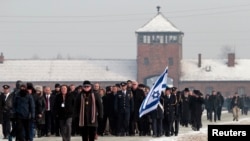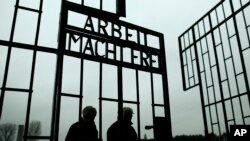About 300 survivors of the Auschwitz-Birkenau Nazi concentration camp gathered Tuesday at the site in Poland to pay their respects to victims who perished in gas chambers or from inhumane treatment and disease.
When the death camp was liberated on January 27, 1945, by the Soviet Army, soldiers found 7,000 prisoners, among them 130 children.
German Chancellor Angela Merkel said Monday it was a "disgrace" that Jews in Germany faced insults, threats and violence. Merkel joined survivors in a commemorative ceremony marking the 70th anniversary of the liberation of the most notorious Nazi death camps of World War II.
Before departing for Poland, German President Joachim Gauck told the parliament in Berlin the lessons of the crimes of Auschwitz were "woven into the texture of our national identity.'' From the "guilt and shame and remorse'' of the Nazi genocide, modern Germany has become a champion of human rights and equality, he said.
Other world leaders and dignitaries, the presidents of Poland, Israel, and France, Pope Francis and U.N. Secretary General Ban Ki-Moon, have marked the occasion.
But this may be the last time witnesses of the Holocaust participate in a major ceremony, since the youngest of them are in their 70s. They returned to Auschwitz to pay tribute to victims and tell their stories.
“None of us believed that people worked in the mud, that when someone could not work they were shot, that there were piles of bodies. After I arrived, I did not need to imagine, I saw it. That is why after the war I could not come here for 50 years. Because I did not see people, I only saw prisoners or bodies or the smoking chimneys of crematoriums,” said Alina Dabrowska, who was just a child when she arrived at Auschwitz.
For another survivor, the 88-year-old David Wisnia, "It is a lifetime ago really" that brings back shocking memories.
"Last night sleeping ... I had a horrible dream and woke up and looked out the window and sort of thought that I was back in Birkenau in cell block 14 where I started in 1942," Wisnia said.
The 79-year-old Róża Krzywobłocka-Laurow from Poland was sent to Auschwitz in 1944 when she was only eight-years-old. "If I survived it was to warn against this ever happening again," she said at the bullet-riddled "Wall of Death", where the Nazis shot thousands.
As part of Adolf Hitler's genocide plan against European Jews, called the "Final Solution", more than 1.3 million people were sent to Auschwitz-Birkenau in the occupied southern Polish town of Oswiecim between June 1940 and January 1945.
About 1.1 million of them, mainly European Jews, perished in the gas chambers or from starvation and disease. The Nazis killed 6 million of pre-war Europe's 11 million Jews.
Vice President Joe Biden said, "We mark this milestone at a moment when too many hearts in too many places are still full of the hatred that seeks to eliminate innocent life on the basis of religion, ethnicity, or identity. Recent violent attacks against Jews in France and elsewhere in Europe make unmistakably clear that the scourge of anti-Semitism persists and must be confronted.
"Tom Lantos, a Holocaust survivor who served with honor in the United States Congress, used to say, 'The veneer of civilization is paper thin. We are its guardians. We can never rest.' We have to reclaim the words 'never again.' It must be more than a lament. It must remain our commitment," said Biden.
Steven Spielberg, the Oscar-winning director for the Holocaust drama "Schindler's List", condemned "the growing effort to banish Jews from Europe," in a statement before departing for Poland. He has videotaped and has taken testimonies of 58,000 survivors.
With their compelling stories of nightmares and flashbacks from perhaps the most horrendous life experience in the history of mankind, the survivors of the Holocaust convey above all a very strong and powerful message, "let us not forget, for that not to be ever repeated."






